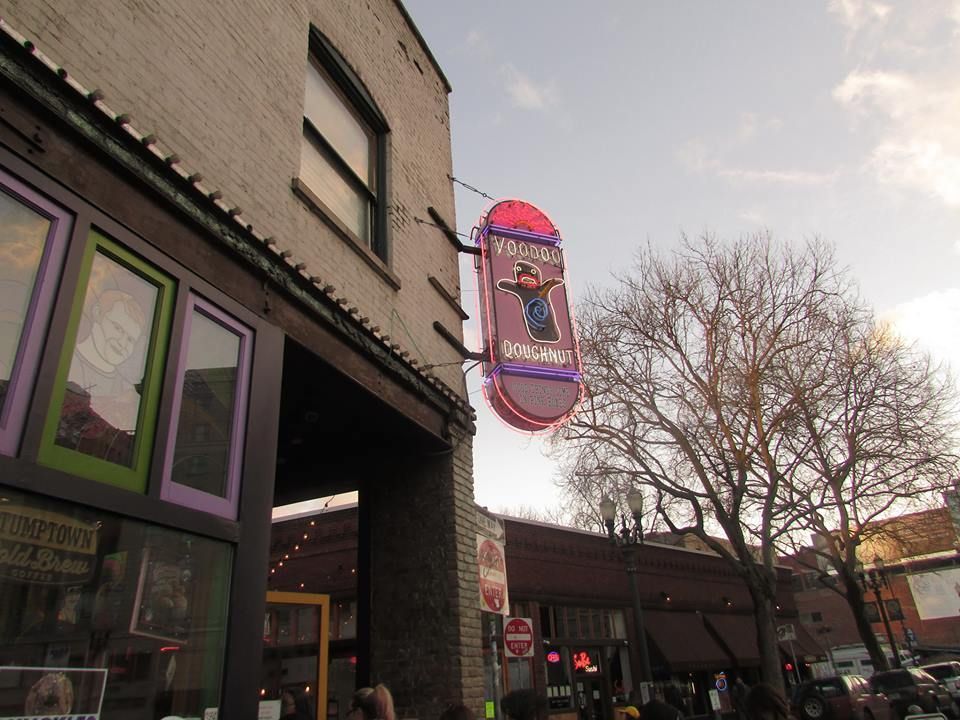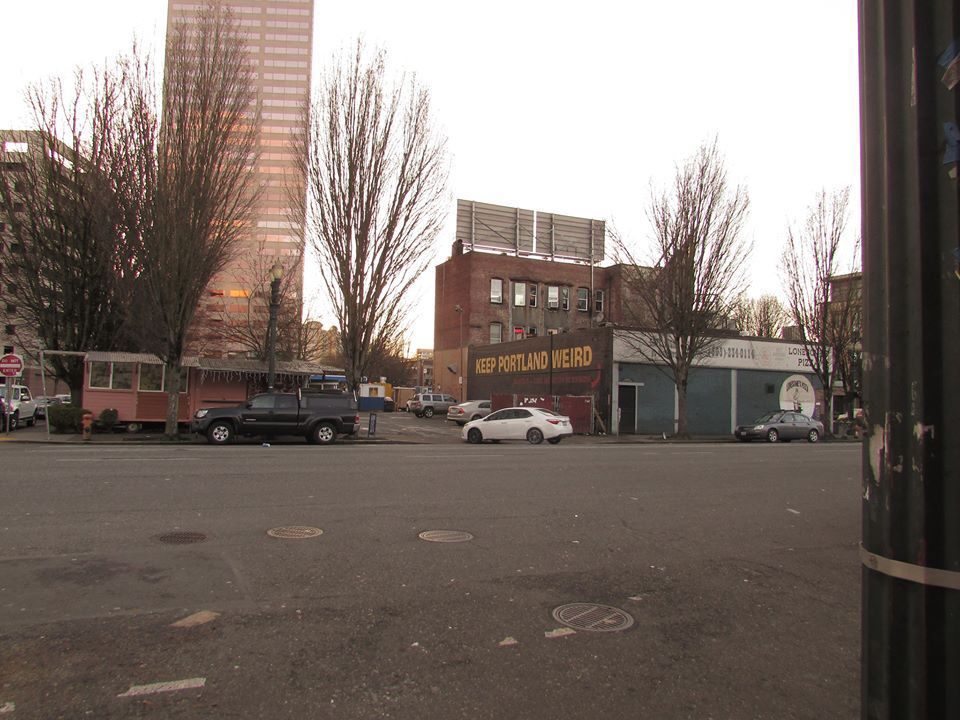A Literary Cities piece on Portland, by Katerina Bryant.
Portland, as Fred Armisen and Carrie Brownstein say, is where young people go to retire. Lining up an hour for Voodoo Donuts or staying safely ensconced in a book store to avoid the rain are very easy, very Portland retiree things to do.

I’ve recently moved to Forest Grove, Oregon. It’s a 40-minute drive out of Portland. Population: 20,000. You’ll find Forest Grove at the end of the bus line surrounded by towering trees with moss-covered branches. It’s the kind of place where kids still play in the streets without their parents’ nearby. When I sit outside on my porch on a crisp Friday night, I can hear the church band playing across the street.
I live between these two places, spending my free days in Portland and studying in Forest Grove. Each place is different and engages with literary culture in its own way. I love the little ‘Free Library’ boxes scattered around my small town and I dream about Portland’s Powell’s City of Books, the largest independent new and used bookstore in the world.
Powell’s spans a city block, has about 1.6 acres of retail floor, has nine colour-coded rooms, 3,500 different sections and all in all, about 1 million books. There’s even a coffee shop where patrons can caffeinate themselves and on the top floor, a rare book room filled with paper quality you wouldn’t believe. Powell’s will send anyone’s heart a flutter, but in contrast to my hometown of Adelaide where bookstores are shutting all over, it was particularly wonderful to find myself in a flourishing feminist magazine section.

In America, it’s easy to get caught up in wonder. Deep-dish pizza! Big bookstores! The Super Bowl! I fell in love with the scores of literary magazines towering over me on a wall in Powell’s. Portland is a place that is not only receptive to reading, but engaged with all artistic pursuits whether that’s jazz, experimental theatre or bead-making. I took the physical manifestation of Powell’s as a testament to a dedicated literary culture.
But if we know anything after following the US Presidential candidates (I’m still not sure anyone has actually learnt anything from this process), it’s that America is a knot of contradictions. It’s the land of the free without free healthcare. It’s the land of literary magazines without adequate payment for writers.
As my Creative Writing classmates have informed me, magazines, on average, don’t pay their writers. And while there are a small percentage that do (The New Yorker, McSweeney’s, The Atlantic if you were wondering), there are established journals that don’t pay. And even worse, there is a culture of young writers who don’t seek payment or believe payment will ever be on the cards.

‘Fifty to a hundred dollars for a story? That’s so good’, one of my classmates tells me.
I couldn’t tell her that it should be better for writers trying to pay rent, because in her eyes, writers can’t pay the rent on their writing alone.
Jennifer Mills put it best when she said, ‘We get into debt for our writing, or fight for an internship, or take all the free-freelancing as notches of pride on our career bedposts. We do it for the relationships or the profile, and that’s fine. It’s a fact of life. We accept this fact of life like workers in the 1920s accepted twelve hour days and child labour.’
Australia isn’t miles ahead of the US; we have plenty of publications that offer ‘exposure’ instead of cash or internships that offer little in the way of professional development. But we also have a dedicated team of literary journals who offer payment: Voiceworks, Overland, Kill Your Darlings, The Canary Press, The Lifted Brow.
For America’s utopia of ample bookshelves and star-studded festivals like PEN, there is the stark contrast of underpaid writers.
Not to say payment for work is the most valuable thing writers can gleam from a rich literary culture, I’ve enjoyed free readings and panels of talented and accomplished writers. I’ve been supported in my work by my peers and financially assisted to attend writing events by my university.
Next week I’ll be taken to see Cristina Henriquez talk about her book The Unknown Americans. I’ll be driven there by new writer friends and accompanied by a professor who has given me lots of thoughtful feedback on my own writing. Forest Grove is a little ‘rustic’ American town, but it doesn’t seem so far from Portland as, say, Broome does from Melbourne. The literary culture may be less financially viable here in the US, but even in little old Forest Grove, it’s thriving. For the mean time, I’ll subsist my income by selling the books I’ve already read back to Powell’s and writing for Australian publications.
This is a Literary Cities piece, part of a series where writers reflect on the places and experiences that have inspired them. To read more like this, click here.
Katerina Bryant
Katerina Bryant is a writer based in Adelaide and Writers Bloc's Writing Development Manager. Her work has appeared in the Griffith Review, Kill Your Darlings and The Lifted Brow, amongst others. She tweets at @katerina_bry.

